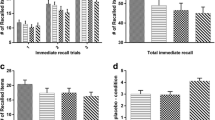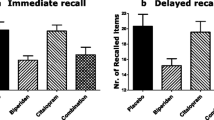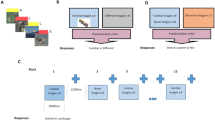Summary
Primary and secondary memory were tested in depressive patients by means of immediate free recall of lists of words in a double blind intraindividual cross-over comparison between ACTH4-10 in a single s.c. dose and placebo, in connection with the second and third unilateral electroconvulsive treatment (ECT).
The results of the study did not show any memory facilitating effect of ACTH4-10 in immediate recall from primary and secondary memory, after ECT.
The results indicate a negative effect of ECT on delayed recall from secondary memory 120 min after ECT.
Similar content being viewed by others
References
Abt K (1983) Significance testing of many variables. Problems and solutions. Neuropsychobiol 9:47–51
Anonymous (1965) The experience of electroconvulsive therapy by a practising psychiatrist. Br J Psychiatry 111: 365–367
Baddeley AD, Warrington EK (1970) Amnesia and the distinction between long- and short-term memory. J Verb Learn Verb Behav 9:176–189
Branconnier RJ, Cole JO, Gordon G (1978) ACTH 4-10 in the amelioreation of neuropsychological symptomatology associated with senile organic brain syndrome. Psychopharmacol Bull 14:27–30
Craik FIM (1970) The fate of primary memory items in free recall. J Verb Learn Verb Behav 9:143–148
Cronholm B, Ottosson J-O (1961) Memory functions in endogenous depression before and after electroconvulsive therapy. Arch Gen Psychiatry 5:193–199
d'Elia G (1970) Unilateral electroconvulsive therapy. Acta Psychiatr Scand [Suppl] 225
d'Elia G, Frederiksen S-O (1980a) ACTH4-10 and memory in ECT-treated and untreated patients. I. Effect on consolidation. Acta Psychiatr Scand 62:418–428
d'Elia G, Frederiksen S-O (1980b) ACTH4-10 and memory in ECT-treated patients and untreated controls. II. Effect on retrieval. Acta Psychiatr Scand 62:429–435
d'Elia G, Frederiksen S-O (1984) ACTH4-10 and memory in psychiatric patients. In: Shah NS, Donald AG (eds) Psychoneuroendocrine dysfunction. Plenum, New York London, pp 243–254
Dornbush RL, Volavka J (1976) ACTH4-10: A study of toxicological and behavioral effects. Neuropsychology 2:350–360
Drachman DA, Arbit J (1966) Memory and hippocampal complex. II. Is memory a multiple process? Arch Neurol 15:52–61
Draper RJ, Feldman B, Haughton H (1978) Trial of peptide fraction of ACTH (ACTH4-10) in the alcoholic brain damage syndrome. Paper presented at the 2nd world congress of Biological Psychiatry, Barcelona, August 31–September 6, 1978
Ferris SH, Sathananthan G, Gershon G, Clark C, Moshinsky J (1976) Cognitive effects in the elderly. Pharmacol Biochem Behav 5 [Suppl 1]:73–78
Glanzer M (1971) Short-term storage and long-term storage in recall. J Psychiatr Res 8:423–438
Glanzer M, Cunitz AR (1966) Two storage mechanisms in free recall. J Verb Learn Verb Behav 5:351–360
Holm S (1979) A simple sequential rejective procedure. Scand J Stat 6:65–70
Murdock BB (1967) Recent developments in short-term memory. Br J Psychol 53:421–433
Piercy MF (1977) Experimental studies of the organic amnesic syndrome. In: Whitty CWM, Zangwill OL (eds) Amnesia. Butterworths, London, pp 1–51
Postman L, Keppel G (1968) Conditions determining the priority of new items in free recall. J Verb Learn Verb Behav 7:260–263
Rigter H, Riezen M v (1978) Hormones and memory: In: Lipton A, Mascio AD, Killan KF (eds) Psychopharmacology: a generation of progress. Raven Press, New York, pp 677–689
Roberts WA (1969) The priority of recall in new items in transfer from part-list learning. J Verb Learn Verb Behav 9:645–652
Small JG, Small IF, Milstein V, Dian DA (1977) Effects of ACTH4-10 on ECT induced memory dysfunctions. Acta Psychiatr Scand 55:241–250
Tulving E, Colotla V (1970) Free recall of trilingual lists. Cognit Psychol 1:86–98
Tulving E, Patterson RD (1968) Functional units and retrieval processes in the free recall. J Exp Psychol 77:239–248
Underwood G (1976) Attention and memory. Pergamon Press, Oxford
Watkins MJ (1974) Concept and measurement of primary memory. Psychol Bull 81:695–711
Watkins MJ, Watkins OC (1974) Processing of recency items for recall. J Exp Psychol 102:488–493
Weiskrantz L (1966) Experimental studies of amnesia. In: Whitty CWM, Zangwill OL (eds) Amnesia. Butterworths, London, pp 135
Wough NC, Norman DA (1965) Primary memory. Psychol Rev 72:89–104
Williams M (1977) Memory disorders associated with electroconvulsive therapy. In: Whitty CWM, Zangwill OL (eds) Amnesia. Butterworths, London, pp 183–198
Author information
Authors and Affiliations
Rights and permissions
About this article
Cite this article
Frederiksen, SO., d'Elia, G. & Holsten, F. Influence of ACTH4-10 and unilateral ECT on primary and secondary memory in depressive patients. Eur Arch Psychiatr Neurol Sci 234, 291–294 (1985). https://doi.org/10.1007/BF00381038
Received:
Issue Date:
DOI: https://doi.org/10.1007/BF00381038




